Emperor Akbar Chapter Notes | Social Studies for Class 4 PDF Download
| Table of contents |

|
| Introduction |

|
| Akbar, the Conqueror |

|
| Akbar and the Rajputs |

|
| Akbar’s Religious Beliefs |

|
| Akbar, the Builder |

|
| The End of Akbar’s Rule |

|
| Points to Remember |

|
Introduction
- Akbar was one of the greatest rulers of India. He was so famous and powerful that people called him Akbar the Great.
- He was born in 1542, and his father was the Mughal Emperor Humayun, and his mother was Hamida Banu Begum.
- When Akbar was just 14 years old, he became the ruler of a huge kingdom.
- He ruled India for almost 50 years—from 1556 to 1605.
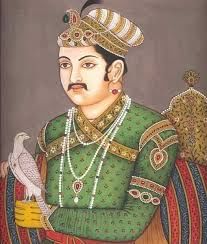 Akbar
Akbar
Akbar, the Conqueror
Akbar was a brave leader who built a large empire by winning many battles. Here are some of his victories: Rani Durgavati, Maharana Pratap, and Chand Bibi.
Rani Durgavati, Maharana Pratap, and Chand Bibi.
- Second Battle of Panipat:
- Akbar fought and defeated a strong leader named Hemu, who was in charge of the Afghan forces.
- This battle was in 1556, and after winning, Akbar became more powerful and controlled a large part of northern India.
- Rani Durgavati:
- She was the queen of the Gond people, and she was very brave.
- Akbar's army fought against her, and he won. After this, her kingdom became part of Akbar's empire.
- Battle of Haldighati:
- This was a famous battle between Akbar and Maharana Pratap, the king of Mewar.
- Even though Maharana Pratap didn’t win, he kept fighting for a long time to keep his kingdom free from Akbar’s rule.
- Chand Bibi:
- She was the ruler of Ahmadnagar in southern India. Akbar's army also defeated her, and her land became part of his empire.
Akbar and the Rajputs
The Rajputs were strong rulers who controlled many kingdoms in Rajasthan. Akbar wanted their support to make his empire stronger. So, he: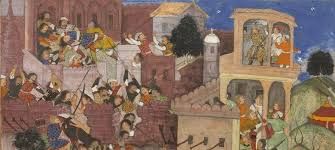
- Respected the Rajput kings and treated them kindly.
- Gave them important jobs in his court so they would feel like part of his empire.
- Married Rajput princesses to build strong relationships with them.
With the help of the Rajputs, Akbar’s empire became even more peaceful and powerful.
Rules and Reforms
Akbar wasn’t just a fighter; he was also a kind and fair ruler. He did many things to help the people in his empire:
- He stopped unfair taxes that were difficult for people, especially those who were not Muslims.
- He reduced taxes on farmers so they wouldn’t have to pay too much money, making their lives easier.
Akbar’s Religious Beliefs
Akbar believed that everyone should be treated equally, no matter what religion they followed. Here’s what he did:
- He respected all religions and treated everyone the same, whether they were Hindus, Muslims, or from any other religion.
- He understood that all religions teach us to be kind, peaceful, and respectful.
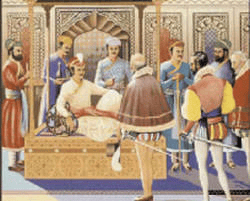
- Love: Being kind to everyone.
- Peace: Living without fighting.
- Respect: Treating everyone with care.
- Tolerance: Letting people believe in what they want.
Akbar, the Patron of Arts and Culture
Akbar loved learning and encouraged art and music in his court. He wanted his empire to be full of creativity and knowledge:
- He had important books like the Ramayana and the Mahabharata translated into Persian, so more people could read them.
- He supported painters and musicians to create great work.
Famous People in Akbar’s Court
Akbar had many famous and talented people in his court who helped him:
- Mian Tansen: A famous singer who was known for his beautiful voice.
- Abul Fazl: He wrote a book called Akbarnama, which tells the story of Akbar’s life.
- Raja Birbal: He was Akbar’s advisor and known for his cleverness and funny stories.
- Raja Todar Mal: He helped Akbar manage money and collect taxes.
- Raja Man Singh: One of Akbar’s most trusted generals who led many battles for him.
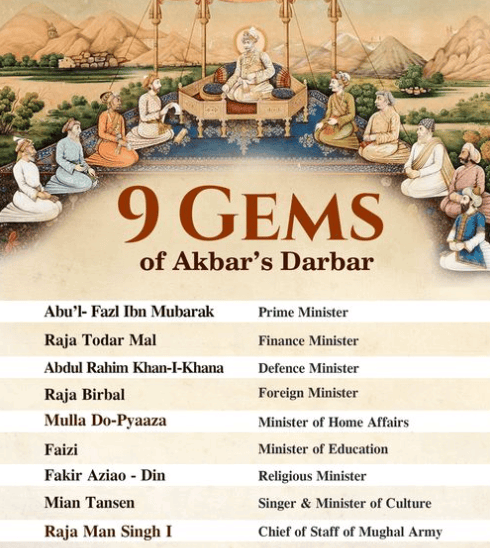
Akbar, the Builder
Akbar also loved to build big and beautiful places. Some of his most famous constructions are:
- Agra Fort: A huge fort in the city of Agra, which is still very famous today.
- Fatehpur Sikri: Akbar built this entire city near Agra. It was designed to be the capital, but it was later abandoned because there wasn’t enough water.
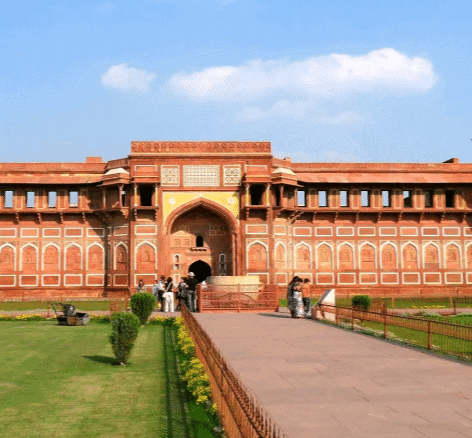 Agra Fort
Agra Fort
The End of Akbar’s Rule
After ruling for many years, Akbar died in 1605. His son Jahangir became the next ruler of the Mughal Empire and continued many of the things Akbar had started.
Points to Remember
- Akbar, known as Akbar the Great, was born in 1542 to Emperor Humayun and Hamida Banu Begum.
- He became the ruler at the young age of 14 and ruled India for nearly 50 years, from 1556 to 1605.
- Akbar expanded his empire by winning major battles, including the Second Battle of Panipat against Hemu in 1556, defeating Rani Durgavati, Maharana Pratap, and Chand Bibi.
- Akbar gained the support of the Rajputs by respecting them, offering them high posts, and marrying Rajput princesses, which helped make his empire more powerful.
- As a ruler, Akbar stopped unfair taxes on non-Muslims and reduced the tax burden on farmers, making life easier for his people.
- Akbar treated all religions equally and introduced a new religious path called Din-i-Illahi, which promoted love, peace, respect, and tolerance.
- He encouraged the arts and had important texts like the Ramayana and Mahabharata translated into Persian, while also supporting famous musicians and artists.
- Notable figures in Akbar’s court included Mian Tansen, Abul Fazl, Raja Birbal, Raja Todar Mal, and Raja Man Singh.
- Akbar built significant structures like the Agra Fort and the city of Fatehpur Sikri, which was later abandoned due to water shortages.
- After his death in 1605, his son Jahangir became the next ruler of the Mughal Empire.
|
49 videos|177 docs|46 tests
|
FAQs on Emperor Akbar Chapter Notes - Social Studies for Class 4
| 1. Who was Emperor Akbar and why is he called "The Conqueror"? |  |
| 2. How did Akbar interact with the Rajputs during his reign? |  |
| 3. What were some of the notable rules and reforms implemented by Akbar? |  |
| 4. What were Akbar's religious beliefs and how did they influence his rule? |  |
| 5. Who were some famous people in Akbar's court and what were their contributions? |  |















